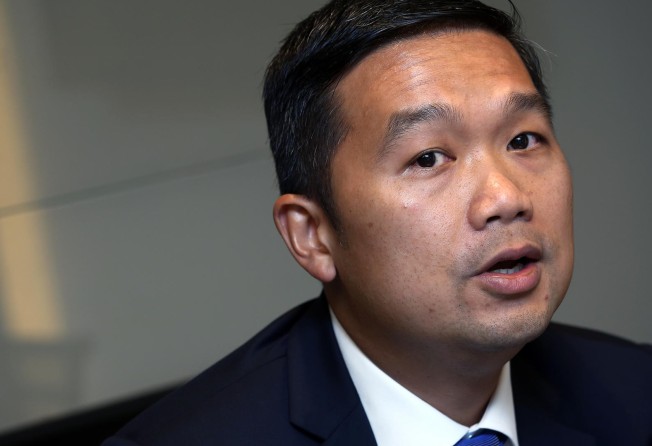Telok's small-flats strategy catering to Macau's young buyers proves successful
Philip Pang's Telok Real Estate Partners found a niche in Macau with a focus on developing small flats and is now exploring opportunities in hotel development and urban renewal in the enclave

Philip Pang, with his 19 years of experience in real estate investment, is taking to a different tack to the major developers that have focused on luxury residential properties for foreign buyers in Macau.
As a partner at Telok Real Estate Partners, Pang is responsible for the investment activities of the bouquet-sized developer. His team's focus on building small flats at affordable prices for young people in the former Portuguese colony has been successful. Today, the firm is entering another new phase by exploring development opportunities in hotel and urban renewal in Macau, which has a population of 630,000, roughly equivalent to Sha Tin district in Hong Kong.
Before joining Telok as a partner in October 2009, Pang was a director of Deutsche Bank and was primarily responsible for originating and structuring real-estate-related private equity investments. He formulated investment strategies for opportunistic funds and originated and closed the first real estate investment fund in mainland China for Deutsche's Real Estate Opportunistic Fund. Previously, he was a principal of Macquarie Real Estate Asia, the senior adviser to Schroder Asian Properties, a US$308 million private equity real estate fund.
During his tenure, the fund completed several significant transactions including the acquisition of the original serviced-apartment portfolio of the Shama Group in Hong Kong and the establishment of First China Property Group, a joint-venture residential development company based in Shanghai with the Schroder Asia Properties Fund and Macquarie Bank.
Prior to that as a member of Bankers Trust's Real Estate Investment Banking Group, Pang worked on corporate finance, structured finance, distressed asset/non-performing loan portfolio restructuring and real estate direct investments in New York, Tokyo and Hong Kong.
Will the company expand its reach to Hong Kong, where the property market is opening up for smaller developers after the government made a U-turn to increase land supply in 2012?
We found Macau has greater potential for small players like us. Most big developers prefer pouring money into mainland China instead of focusing on Macau. It means less competition for us in land replenishment. Although we are a Hong Kong-based company, it is hard for us to focus here because sites are easily bid up by developers to more than HK$1 billion.
What is the potential to redevelop urban areas in Macau?
According to our study, there are 55,400 units in more than 3,000 residential blocks built before 1990. These buildings mostly are seven storeys high with one unit occupying one floor without a lift. Every building will have an average of 10 to 20 units.
Their condition is becoming poor due to the lack of maintenance.
Are individual property owners willing to sell their apartments?
More importantly, banks are reluctant to offer mortgage lending to properties more than 30 years old. The older the properties are, the harder to find buyers.
With more private developers participating in the urban renewal projects, we can help the owners, who are mostly old people, to unlock their value. After they sell their properties to us, the owners can use the sale proceeds to trade for new flats with much better amenities.
For us, we have land for building new projects after demolishing the old properties.
What is the firm's progress in acquiring old properties in Macau at the moment?
It needs lots of patience. We have to negotiate with each individual owner and convince them to accept the purchase offer.
In Hong Kong, there is the Land Compulsory Sale for Redevelopment Ordinance to speed up urban renewal.
The trigger threshold in the ordinance was relaxed in April 2010 to allow developers to force the sale of remaining flats in buildings more than 50 years old once they had acquired 80 per cent of the property interests in it. This was down from the previous 90 per cent threshold. But there is no such ordinance in Macau.
What is the Macau property market outlook?
The upswing in home prices is making it increasingly difficult for young people to buy their first home in Macau and Hong Kong. But youngsters in Macau appear to have less difficulty than those in Hong Kong. People working in Macau will enjoy a faster pace in salary growth at a time when home prices are declining.
Average annual wage growth in Macau was 15.8 per cent in the past four years, but home prices dropped 12 per cent from the peak in the second quarter of last year, with some new projects falling as much as 30 per cent.
But Hong Kong home prices edged up nearly 20 per cent in the past 12 months, compared with an annual wage increase of 5.8 per cent in the past 10 years. We firmly believe there is a strong demand for mass-market homes in Macau.
What price category and size of homes will be the most sought after in Macau?
For a couple who work in the casinos and earn a monthly income of HK$40,000, they can afford to buy flats worth HK$3 million to HK$4 million each by seeking a mortgage loan of 70 per cent of the flat value.
With a HK$1 million initial down payment, the couple will need one-third of their salary or HK$12,000 for monthly mortgage instalments.